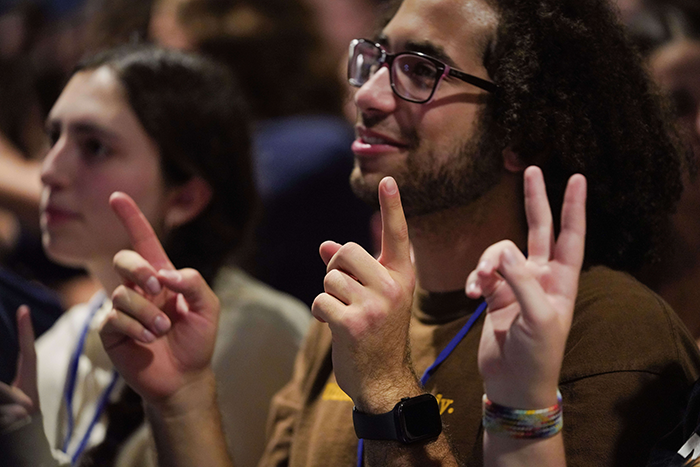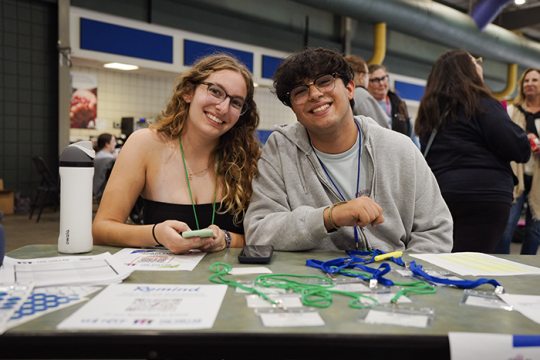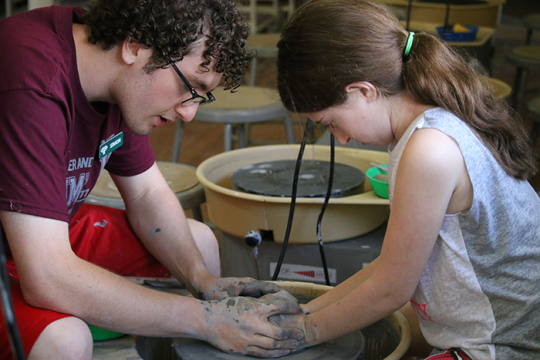
We sat down with two Reform Jewish youth leaders, immediate past NFTY president Benji Rosenblum and former North East Lakes Federation for Temple Youth (NELFTY) vice president Milton Sender, to discuss the evolution of the Jewish teen experience in North America, leadership, identity, and community. Though separated by more than 65 years, Rosenblum and Sender’s experiences share the timeless themes of building confidence, shaping values, forging lifelong connections, and building a lasting legacy across generations.
URJ: How did your upbringing/identity influence you?
Sender: My parents were immigrants from Germany. My father was arrested during Kristallnacht and sent to Dachau concentration camp in 1938. My mother was able to buy his way out after about six months and they made their way to Erie, Pennsylvania.
Even though I was born here in 1943, my first language was German. My parents didn’t speak much English; my grandmother, who came later from Gurs (where many Jews were imprisoned in France during WWII), never learned English. I didn’t lose my accent until I was six or seven years old.
Rosenblum: My mom is Black and Ashkenazi Jewish, and my dad is white and Ashkenazi Jewish. I’m proud to say I’m mixed. And it’s something I bring with me into every leadership space—not to stand out, but to show up fully.
Did those experiences shape how you think about successful leadership?
Sender: For me, assimilation was the goal. I wanted to look like everyone else, talk like them, and dress like them. I thought that was the way to succeed.
Rosenblum: I think my generation is more comfortable existing in the “and.” I’m Black and Jewish, Jewish and American. I’ve learned that showing up fully is a strength.
How did becoming teen leaders impact your leadership style?
Sender: I’ll be honest, it was over 65 years ago!! But I remember that it helped me discover [my] ability to lead. I learned how to create momentum, organize events, and make things happen. I realized I could motivate people and navigate unfamiliar situations. That gave me the confidence to trust myself and act independently. That experience stayed with me.
Rosenblum: That resonates. I think my generation faces a different leadership landscape in some ways. I’ve had to lead through tough moments like rising antisemitism and having complex conversations around identity and inclusion. It can feel like a heavy weight, especially being a young person in rooms full of adults.
What were your experiences with Reform teen youth organizations?
Sender: We had a youth group that turned into Highty in 10th grade, which connected us with NELFTY. We’d go to regional events every few weeks in places like Toronto, Youngstown, and Buffalo. We’d stay in people’s homes and participate in youth-led programming. It helped me acclimate to American life, even though I was born here. I saw how other Jewish families lived, learned to travel independently, and made new friends. It gave me confidence and independence.
Rosenblum: That independence rings true for me, too. NFTY gave me the confidence to step into leadership and explore beyond my immediate circle. But it wasn’t just the programs—it was where I learned what kind of leader I want to be.
What are your thoughts about NFTY today?
Sender: I’m thrilled that it’s still going, and that it’s producing leaders like [Benji]. That said, I do sometimes feel a little sad that not as many young people are involved today. There are so many opportunities and competing interests...it seems like youth engagement isn’t always prioritized.
Rosenblum: That’s true, but I’ve seen our community work really hard to adapt. We’ve created fellowships, are exploring online options, and reaching teens in new ways that align with their interests and commitments.
What do you think is the key to engaging more young people?
Sender: One thing I’ll say: make it fun. When I was [a teen], we didn’t need much—just a place to gather, dance, and meet other Jewish teens. The cost was low, but the experience was high impact. Start [engaging] in seventh or eighth grade and give them something to enjoy. Learning can come after connection.
Rosenblum: Totally agree. Joy is an essential part of engagement. When teens enjoy being together, everything else—leadership, identity, connection—follows.
What advice would you give to aspiring teen leaders?
Sender: Whatever you do should be noble, profitable, and fun. It’s like a three-legged stool—if one leg’s missing, the whole thing falls. If you’re not proud of what you’re doing, you won’t stick with it. If it’s not enjoyable, you won’t give it your best. And if it doesn’t sustain you, it’s not viable.
Also: “focus and finish.” Don’t do 10 things halfway. Pick something, commit to it, and follow through. That’s how you build something that lasts.
Finally, you both dedicated a lot of time and energy to NFTY. What would you say you’ve gained from your work?
Rosenblum: I’ve spent the last few years trying to build something meaningful—and I know that wherever I go next, I’ll carry this experience with me.
Sender: NFTY gave us both some powerful things: confidence, connection, and the ability to lead.
Want to be a part of shaping NFTY for future generations? Learn how you can help teens connect with their Judaism and each other today!
Related Posts

Leadership Boot Camp: A Clean Page, Infinite Possibilities

9 Programs Empowering Jewish Teen Leaders

